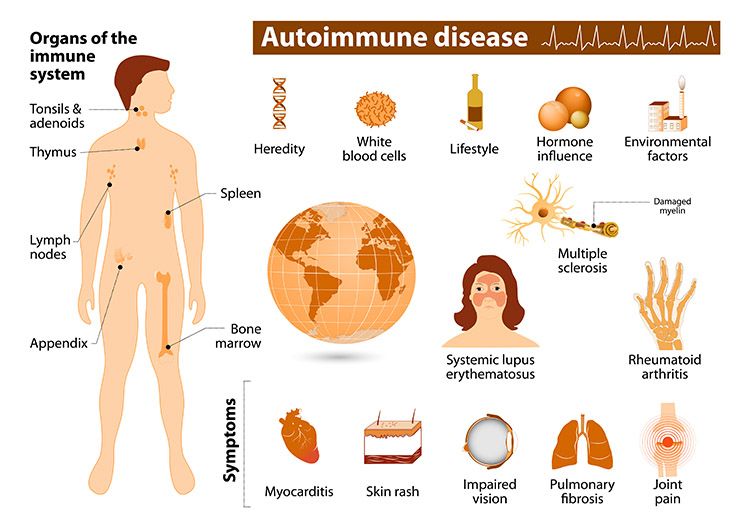Types of Autoimmune Disease

Autoimmune diseases affect the immune system, causing various symptoms in different body parts. These can range from inflammation of muscles and joints to rashes and headaches. They can also affect the heart, kidneys, and lungs. Neurologic issues such as fatigue and weakness are also common.
Symptoms
When a person suffers from an autoimmune disease, their body responds in a way that triggers an attack against itself. These attacks are called flare-ups. These attacks can be extremely painful and have various symptoms that vary depending on the type of autoimmune disease. In addition to the physical symptoms, flare-ups are associated with psychological and emotional stress. Many people with autoimmune disease report having experienced some emotional stress before developing the disease.
One of the most common symptoms of autoimmune disease is extreme or chronic fatigue. This fatigue is likely a result of the energy expended by the immune system. Interestingly, women make up 75 percent of all autoimmune disease patients. This could be because women are more prone to experiencing autoimmune disease symptoms, as women produce more complex immune responses. Additionally, female sex hormones are believed to influence the level of inflammation.
Treatments
Treatments for autoimmune disease focus on using broad-acting drugs that dampen the immune system and prevent it from attacking things it shouldn't. While these treatments can be very effective, they're not designed to treat the underlying cause of the disease. Instead, according to Joanne Reed, a Westmead Institute for Medical Research researcher, these medications target only the symptoms of autoimmune disease.
There are many treatments for autoimmune diseases, and some are more effective than others. In most cases, medical treatments will involve using immunosuppressants such as steroids. However, there are other types of treatments that can be used as well. For example, many people can also use herbal medicines to help train their immune systems.
Causes
A person's immune system consists of specialized blood cells that help protect the body against harmful substances. These substances contain antigens that the immune system recognizes and attacks. As a result, autoimmune diseases develop. These diseases can affect a wide variety of tissues and organs. In addition, they cause different symptoms depending on the specific condition.
Some of these autoimmune diseases are inherited. Infections or bacteria can cause them. However, others are triggered by environmental factors, such as sun exposure. These autoimmune diseases are often treatable with drugs that suppress the immune system.
Environmental factors
Although genetic predisposition alone accounts for about 30% of cases of autoimmune diseases, numerous other factors, such as dietary components, infections, and toxic chemicals, can trigger autoimmune disease. As a result, autoimmune disease is often difficult to diagnose and has nonspecific symptoms, including malaise, fatigue, low-grade fevers, and aches and pains.
While researchers have understood the genetic causes of autoimmune diseases, many still do not understand the role of environmental factors in developing this disease. Therefore, scientists use epidemiological evidence to identify non-genetic risk factors affecting a person's immune system. Several studies have shown that environmental factors may play a much bigger role than previously thought. For example, research from the Scripps Institute found that environmental factors may be responsible for 70 percent of autoimmune disease cases.
Genetics
To understand autoimmune disease, scientists must better understand its genetic underpinnings. To do this, researchers use high-quality genetic data to map the human genome more precisely. They find that most variants that contribute to the disease are located in regions that do not encode proteins and act as switches that regulate the activity of the coding genes. The challenges of determining the functional impacts of these variants remain, but they provide important information to researchers.
The genetics of the autoimmune disease is extremely complex. The genetic background of each individual affected is unique, and the disease itself is caused by a complex interaction between inherited and environmental factors. As a result, there is an enormous pool of DNA mutations in inbred and outbred populations, and each of these mutations affects gene expression and function. While many of these mutations are undetectable, the cumulative effects of several different mutations can result in a measurable autoimmune phenotype.




